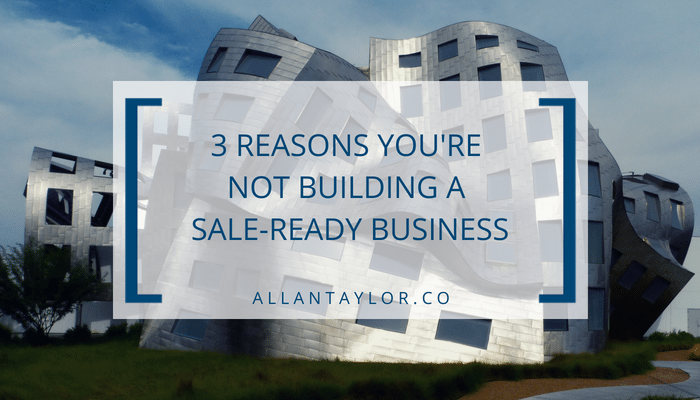There are real reasons why business owners aren’t sale-ready, but are they good reasons? Barbara Taylor shows us why we may not be building our business with that potential sale in mind. Posted with permission (see original article here).

What’s been keeping you up at night as a business owner? Is it taxes, employee issues, cash flow troubles? How about rising interest rates, the threat of a trade war, healthcare or managing growth?
I’ll go out on a limb and guess that the question of whether or not your business is sale-ready hasn’t ranked high on your list of late-night worries. In fact, there’s a good chance it hasn’t made the list at all. Like a lot of things, the salability of your business isn’t a problem…until it is. And by then it’s often too late to do much about it.
If you believe there’s wisdom in owning a business that’s attractive to buyers — regardless of whether you plan to sell — let’s look at three reasons why you’re not actively engaged in making sure your business is sale-ready.
You think you’ll never sell your business
Many business owners have no plans to sell their business. Ever.
If you fall into this camp, there are typically two reasons why: 1) You’ve chosen an alternative exit strategy for leaving your business some day, or 2) You love your business so much that you never want to leave.
Here’s the problem with both.
Regardless of your preferred exit strategy, selling should always be your backup plan. We’ve worked with countless owners over the years who thought their kids would take over the business, or their managers would buy them out, or they’d sell to an existing partner or competitor, etc. Then life threw a monkey wrench into their plans. If you’ve built your business so that it’s attractive to outside buyers and Plan A doesn’t work out, it’s fairly easy to switch gears and adopt selling your business as Plan B.
Even if your preferred exit strategy is to sell to an internal buyer, your business still needs to have something that all sale-ready businesses have: transferable value.
If you fall into the second camp and claim you will never leave your business, you’re not doing anyone any favors by denying the obvious: Nobody is immortal, or clairvoyant. Sticking your head in the sand isn’t going to change the fact that you will leave your business in one of two ways: voluntarily or involuntarily. An involuntary exit tends to come with a lot of downside, including leaving money on the table and your employees without jobs, watching all your hard work evaporate, and just being an altogether unpleasant experience.
 Knowing this, why not set things up so you’ll be able to leave on your own terms at some point?
Knowing this, why not set things up so you’ll be able to leave on your own terms at some point?
Just because you’ve built a sale-ready business doesn’t mean you plan to sell it. If the term “sellability” or “sale-ready” makes you feel queasy, then call it something else. There are lots of other ways to think about owning a sale-ready business:
- It’s a form of insurance, in case something unexpected happens.
- You’ll be in a strong negotiating position if you’re ever approached with an unsolicited offer.
- It will be easier to raise capital if and when you need to.
- It’s a management philosophy (i.e. you’re focusing on things that build value in your business).
- It’s an investment philosophy (i.e. your business is typically the most valuable asset you own, and often has a big impact on personal financial and retirement planning).
- You’ll have good options available if you change your mind in ten years.
However you want to think about it, just let the thought enter your mind and sink in.
There’s no harm in making sure your business is sale-ready, and plenty of upside for both you and your business.

You’ll prepare your business for sale later
One of the problems with building a sellable business (or any aspect of exit planning for that matter) is that there’s no sense of urgency. What will happen if you don’t start making your business sale-ready this year? Will the wheels fall off? Probably not. Will it have a negative effect on your personal life? Doubtful. In fact, life and business will probably go on as normal.
But procrastination, too, can have dangerous consequences. Most advisors encourage business owners to dedicate at least two years to preparing a business for sale (that doesn’t include earmarking about 12 months for the selling process itself). And it may take longer to make changes to your business that will increase value prior to selling.
To procrastinate is human, to be sure. There’s some interesting science behind why we have trouble doing things that aren’t urgent, even if they come with a big payoff. Studies show that, when given a choice, most people will choose to focus on the things that are more urgent yet less rewarding. In other words, if you want to build a sale-ready business, you may have to override your own cognitive bias.
Like most things in business, getting your company sale-ready typically takes longer than you’d think. The earlier you start, the easier it will be when you are ready to sell. The heavy lifting will be done, and you’ll likely reap the benefits in the form of a higher valuation, better deal terms, and a smoother and quicker due diligence period.
You’re not sure how to start building a sellable business
If you’re feeling overwhelmed just contemplating the idea of making your business sale-ready, here’s some good news. There’s a simple place to start that requires minimal work on your part: Get a business valuation.
Most business valuations require that you submit at least three-year’s worth of financial statements and tax returns, and answer some fairly straightforward questions. After that, it’s up to the valuation analyst to do all the work.
Consider using an M&A advisor or business broker who does valuations if you’re having the business valued for a hypothetical sale scenario. Business brokers have experience working with real-world buyers, and have their finger on the pulse of what’s actually happening in the business-for-sale marketplace. While the actual number (i.e. estimated selling price) is important, you’ll also want a professional’s point of view on what makes your business attractive to buyers, and what might raise red flags or make selling more difficult.
The simple exercise of having your business valued should give you clarity on where you stand now, and what to do next in terms of increasing both the value and sellability of your business.
In the pantheon of small-business challenges, making sure your biggest asset (your business) is sale-ready often gets lost in the shuffle. But out of sight, out of mind doesn’t erase the logic behind making sure you own a sellable business. Give it some thought. Add it to your to-do list. Then start with a business valuation. Once you own a sale-ready business, you may be surprised at how much better you sleep at night.
Would you like to make sure your business is sale-ready? Learn more about our business valuation services, or contact Allan Taylor & Co. to get the conversation started.
 Author: Barbara Taylor
Author: Barbara Taylor
Barbara is co-founder of Allan Taylor & Co. and a former New York Times blogger. She has been a small-business owner since 2003. Barbara lives with her husband, Chris, and their two sons in Northwest Arkansas.
This article originally appeared at: https://www.allantaylor.co/3-reasons-youre-not-building-a-sale-ready-business/.